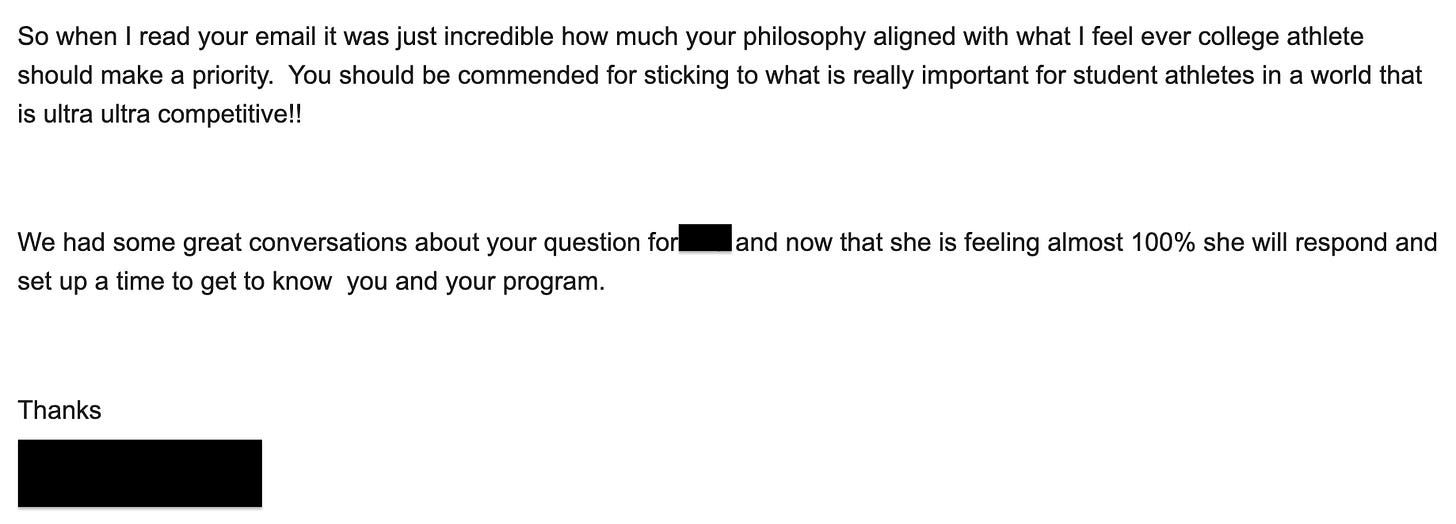Why Your Message to Prospects Better Be More Than Just Information About Your Team
Our research shows that recruits + their parents respond to non-sport messaging IF it's presented in the right way. Here's proof:
The temptation, of course, is to talk about your sport, the team, the facilities, and everything else that is going to revolve around their athletic life on campus once they commit to you.
Resist that temptation.
The fact is, recruits and their parents LOVE to talk sports at first. The start of the process, and your interest along with other coaches’ interest, validates all their hard work and dedication to their sport up to this point. That’s the sugar rush that first gets their attention.
But then something interesting happens. Proportionally, the longer your conversation extends from days into weeks and into months, the more it gets boring for the recruit to talk about their sport with you. If that’s the only topic that ever gets discussed, don’t be surprised when they stop replying and having that conversation with you (there are only so many phone calls recruits want to take when the topic is “how they did” that weekend). The problem is, most coaches only focus on that topic…and many do so because, erroneously, they have been lead to believe that athletes - regardless of division level potential - don’t want to talk about the other aspects of campus life they’ll experience at your school, or a belief and expectation that your admissions department will go over all of that with them at some point.
That misconception costs coaches recruits. And sometimes, as a result, their jobs.
One of our clients emailed us with an example of why a varied message yields great results, and gives insight on how important that is behind the scenes as recruits and their parents work together behind the scenes to determine which coach, program and campus is best for them - and, what they’re using to come to that conclusion.
Quick interruption just to make a teaching point for any college coach who wants to be a Honey Badger Recruiter: You really, really need to understand the multi-layered approach most families take as they make their decision and evaluate different programs that are recruiting them.
Especially today. We have been making the case in the recruiting training workshops we’re leading for athletic departments on campuses around the country that we’re moving into a time period where ‘having a college degree’ isn’t being viewed as the necessary golden ticket to success in life. For athletes who compete in college, the same is true: I might come to compete at your school initially, but what is the reason I should stay there and complete my degree?
It’s up to you to make the case, Coach. Not your admissions department, you. To the extent they can help, fantastic…but as this email demonstrates, athletes and their parents are looking to the coach who is recruiting them to tell them the story of their campus and why going there would be a good decision instead of learning negatives about your campus from other competitors, or making up their own story about you due to a lack of information and conversation about it.
You can see what this parent’s thinking is, which up until this point has been kept from the coach. It wasn’t until the coach sent the messaging series we had designed for them, using specific research from that coach’s team, that the fuller story about their campus and their degree became clearer to the prospect’s family, and began to unfold a different outcome than a rather jaded father had experienced as a college student-athlete.
The email continued:
The keys to successfully deepening the story with this recruit lies in the simple truth I want every coach to follow as they send out their story through letters and emails, as well as social media and their one-on-one conversations, to recruits:
Talk about more than just their sport.
When you do, it creates conversations and insights you may never hear about behind the scenes, but is something we know from our focus group research plays a big part in next-level recruiting.
(and, most college coaches aren’t doing it…so, it’s an instant advantage to you!)



